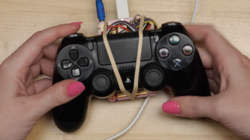Open Hardware/Modding: Hacking, Raspberry Pi in Education, and RISC-V
-
Interfacing Broken PS4 Controllers With A Replacement PCB
[Becky] had some PS4 controllers that were sadly no longer functional. However, most of the buttons and joysticks still appeared to be okay. Thus, she set about designing a replacement PCB to breathe new life into these formerly bricked gamepads.
-
The Pocket265 Is A Pocket-Sized 6502 Single-Board Computer
Single-board computers have been around ever since microprocessors became affordable in the 1970s and never went away. Today we have Raspberry Pis and LattePandas, while back in the ’70s and ’80s there were the Ferguson Big Board, the KIM-1 and a whole array of Intel SDK boards. Although functionally similar to their modern counterparts with a CPU, RAM, ROM and some basic peripherals, the old boards were huge compared to today’s tiny platforms and typically required a rather beefy power supply to operate.
-
Take part in our research study to develop culturally relevant Computing resources for primary schools
We are looking for primary schools in England to get involved in our new research study investigating how to adapt Computing resources to make them culturally relevant for pupils. In a project in 2021, we created guidelines that included ideas about how teachers can modify Computing lessons so they are culturally relevant for their learners. In this new project, we will work closely with primary teachers to explore this adaptation process.
-
The MOS 7600 Video Game Chip Gives Up Its Secrets
A good chip decapping and reverse engineering is always going to capture our interest, and when it comes from [Ken Shirriff] we know it’s going to be a particularly good one. This time he’s directed his attention to the MOS 7600 all-in-one video game chip (Nitter), a mostly forgotten device from the 6502 chipmaker which we featured a few weeks ago when it was the subject of a blogger’s curiosity. The question then was whether it contained a microprocessor or not and even whether it was another 6502 variant, and the answer revealed in the decapping answers that but will disappoint the 6502 camp.
-
The RAD750'S Successor Looks Like It's RISC-V
It's been PowerPC in space for decades, from the Opportunity rover (a 20MHz BAE RAD6000, based on POWER1) to the James Webb Telescope (a 118MHz RAD750 "G3"). These are battle-tested processors in extremely hostile conditions, such as the Juno space probe in orbit around Jupiter where the RAD750 (a 132MHz part with 128MB of DRAM) operates in radiation levels a million times the human lethal dose. As evidence of its performance, it was supposed to be deorbited for destruction in 2021, but was extended to 2025 to examine the inner moons of Ganymede, Europa and Io.
-
Ethersweep: An Easy-To-Deploy Ethernet Connected Stepper Controller
[Neumi] over on Hackaday.IO wanted a simple-to-use way to drive stepper motors, which could be quickly deployed in a wide variety of applications yet to be determined. The solution is named Ethersweep, and is a small PCB stack that sits on the rear of the common NEMA17-format stepper motor. The only physical connectivity, beside the motor, are ethernet and a power supply via the user friendly XT30 connector. The system can be closed loop, with both an end-stop input as well as an on-board AMS AS5600 magnetic rotary encoder (which senses the rotating magnetic field on the rear side of the motor assembly – clever!) giving the necessary feedback. Leveraging the Trinamic TMC2208 stepper motor driver gives Ethersweep silky smooth and quiet motor control, which could be very important for some applications. A rear-facing OLED display shows some useful debug information as well as the all important IP address that was assigned to the unit.
-
3.5” SBC packs 12th Gen chipset and dual channel 4800MHz DDR5
Aaeon recently released their first 3.5” SubCompact board equipped with dual-channel DDR5 SODIMMs. The GENE-ADP6 integrates Intel’s 12th Gen/Celeron processors and flexible connectivity to suit AI edge computing applications.
The GENE-ADP6 accommodates the following 12th Gen Alder Lake-P processors along with Intel’s Irix Xe Graphics for some of the models.�

